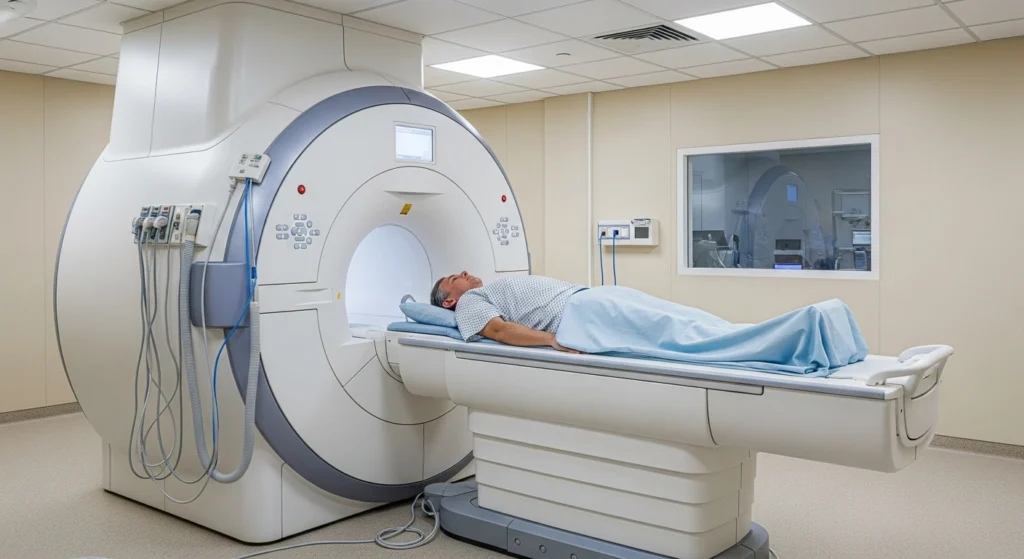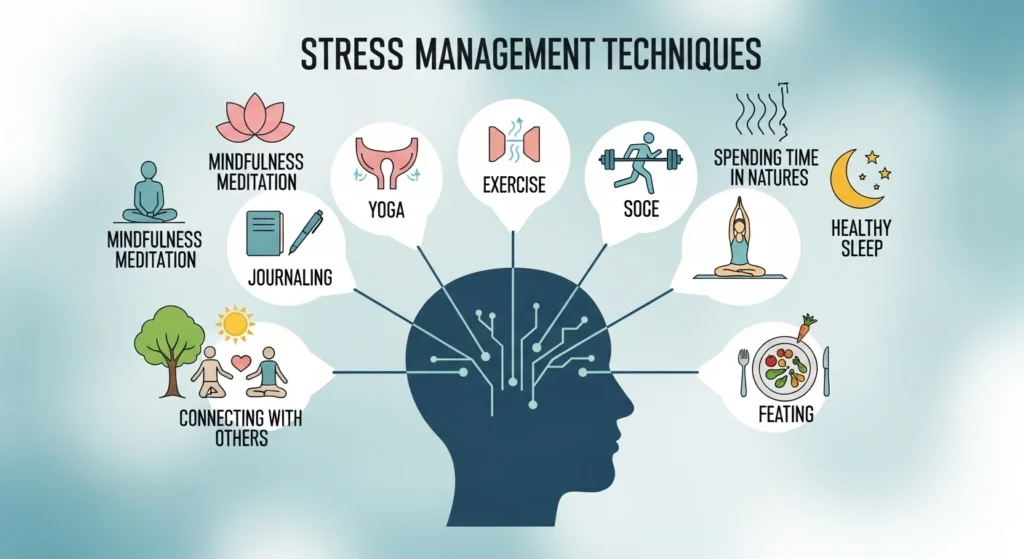Summary
Can MRI Cause Hair Loss? MRI scans do not cause hair loss, as they use non-ionising radiation that doesn’t affect hair follicles. While stress or anxiety during the procedure can lead to temporary hair thinning, the MRI itself poses no risk to hair health. If hair loss occurs after an MRI, it is likely due to underlying health conditions, not the scan.
Introduction
MRI (Magnetic Resonance Imaging) is a standard diagnostic tool used to capture detailed images of the inside of the body. However, there is a growing concern among some individuals: Can MRI cause hair loss? This article aims to explore this question, debunk myths, and provide evidence-backed insights into the potential connection between MRI scans and hair loss.

What is MRI and How Does it Work?
Understanding MRI Technology
MRI, short for Magnetic Resonance Imaging, uses a strong magnetic field and radio waves to generate images of the internal structures of the body. It is a non-invasive diagnostic tool commonly used to examine organs, tissues, and bones. Unlike X-rays or CT scans, MRI does not involve ionising radiation, making it a safer alternative for certain medical conditions.
How MRI Works
When you undergo an MRI scan, the magnetic field aligns the protons in your body. Radio waves are then sent through your body, causing the protons to shift. When the radio waves stop, the protons return to their original alignment, and this movement generates signals that are detected by the MRI scanner. These signals are then converted into detailed images, helping doctors diagnose various health conditions.
Can MRI Scans Cause Hair Loss?
Exploring the Connection
The question of whether MRI can cause hair loss stems from concerns over the effects of the magnetic field or the stress associated with the procedure. However, research and expert opinions suggest that MRI scans do not directly cause hair loss. The primary reason for hair loss usually lies in other factors unrelated to MRI technology itself.
The Role of Radiation in MRI and Hair Loss
One common misconception is that MRIs might cause hair loss due to radiation. However, MRI uses non-ionising radiation, which is different from the ionising radiation used in X-rays or CT scans. Non-ionising radiation does not have enough energy to break chemical bonds or cause damage to cells, including those in hair follicles. As a result, MRIs do not contribute to hair loss directly.
Factors That Might Contribute to Hair Loss Post-MRI
Stress and Anxiety During MRI Procedures
For many people, the thought of an MRI can be stressful. Stress and anxiety can lead to hair loss, particularly in conditions like telogen effluvium, where hair enters the resting phase prematurely due to stress. This temporary hair thinning usually resolves once the stressor is removed.
Underlying Health Conditions That MRI Can Reveal
Sometimes, hair loss can be a symptom of an underlying health issue that an MRI scan uncovers, such as hormonal imbalances, thyroid problems, or nutritional deficiencies. If these conditions are diagnosed after an MRI, they might contribute to hair thinning, but this is unrelated to the MRI itself.
Common Myths About MRI and Hair Loss
Does MRI Cause Permanent Hair Loss?
Many people fear that undergoing an MRI might result in permanent hair loss, but this is not the case. As previously mentioned, the non-ionising radiation used in MRI scans cannot damage hair follicles or disrupt hair growth in a lasting way. Hair loss that occurs after an MRI is typically temporary and linked to other factors, such as stress.
Can MRI Scans Lead to Scalp Damage?
Another myth is that the magnetic field during an MRI could cause physical damage to the scalp or hair follicles. This concern is unfounded. The magnetic field used in MRI is carefully controlled and localised to the area being imaged, posing no threat to hair follicles or the scalp.
How Long Does It Take for Hair to Recover After an MRI?
Understanding Hair Growth Cycles
Hair naturally goes through growth cycles: the anagen (growth), catagen (transition), and telogen (resting) phases. Hair loss due to stress typically affects hair in the telogen phase, leading to shedding a few months later.
Recovery Timeline After Stress-Induced Hair Loss
If stress caused by the MRI procedure leads to temporary hair thinning, hair usually begins to regrow within 6 to 9 months. Hair recovery timelines can vary depending on the individual’s health, the severity of stress, and hair growth rate.
Alternative Reasons for Hair Loss After MRI
Medications and Their Impact on Hair Health
In some cases, the medications prescribed after an MRI or for the underlying condition being diagnosed can contribute to hair thinning. Certain drugs, such as blood thinners or chemotherapy agents, are known to cause hair loss as a side effect.
The Role of Pre-existing Health Conditions in Hair Loss
Conditions like thyroid disorders, autoimmune diseases, or nutritional deficiencies can lead to hair thinning. If these conditions are identified during an MRI scan, they may explain hair loss, but again, it is unrelated to the MRI itself.
How to Prevent Hair Loss During or After an MRI
Stress Management Techniques for MRI Patients
To minimise stress during an MRI, techniques such as deep breathing exercises, meditation, or guided imagery can be very helpful. Practising relaxation techniques before and during the procedure can help reduce anxiety and, by extension, minimise stress-related hair loss.

Post-MRI Hair Care Tips
If you are concerned about hair thinning after your MRI, use gentle hair care products, avoid excessive heat styling, and focus on nourishing your hair with oils and conditioners rich in vitamins and minerals. These measures can help ensure your hair remains healthy and strong.
Frequently Asked Questions (FAQs)
Can MRI cause permanent hair loss?
Is there any risk of hair thinning from MRI scans?
How do stress and anxiety during an MRI contribute to hair loss?
Should I be concerned about hair loss if I have an MRI scheduled?
What should I do if I experience hair thinning after an MRI?
Next Step
MRI scans are a safe and non-invasive diagnostic tool that do not cause hair loss. While stress may lead to temporary hair thinning, there is no direct link between MRI scans and permanent hair loss. If you’re experiencing hair thinning after an MRI, it is likely due to stress or an underlying medical condition, and recovery is possible with time.
If you’re still concerned about hair loss or need expert advice regarding your health, book a consultation with an hair transplant specialist today. Take the next step in understanding your hair health and receive personalised recommendations for optimal care.
